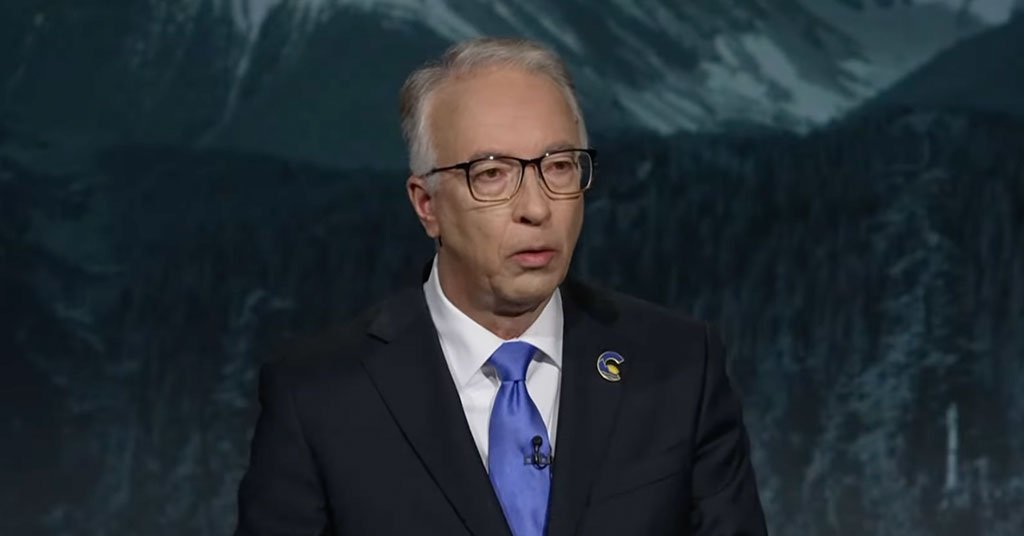[ad_1]
Analysis
First Nations chiefs take issue with John Rustad’s paternalistic rhetoric and plan to roll back Indigenous rights
First Nations leaders say BC Conservative leader John Rustad was “offensive and insulting” in a segment on Indigenous issues during Tuesday night’s leaders’ debate that saw Rustad used paternalistic rhetoric while discussing his plan to repeal a law protecting Indigenous rights.
“I find that remark to be absolutely offensive and insulting given the amazing progress we’ve made with the provincial government over the last several years,” Grand Chief Stewart Phillip of the Union of British Columbia Indian Chiefs told PressProgress.
During Tuesday night’s leaders’ debate, BC Conservative Leader John Rustad gave a bumbling response to a question about Indigenous communities in BC.
Rustad has previously signaled that the BC Conservatives hope to repeal the United Nations Declaration of Rights of Indigenous Peoples, focusing instead on what Rustad calls “economic reconciliation.”
While speaking about his plan to replace this law enshrining Indigenous rights, Rustad used paternalistic rhetoric while describing the government’s relationship with First Nations.
“That is what ‘economic reconciliation’ is, connecting with people, making sure they have the opportunity to build a future and look after the kids,” Rustad said. “That’s what any parent in the province would want, and that’s what we need to deliver when we’re working with First Nations in BC.”
BC NDP Leader David Eby replied by calling out Rustad’s mischaracterization.
“I don’t know if I would compare our relationship with First Nations to parent and child. I would compare it as a partnership, as a true partnership,” Eby responded. “We’re working together to build a province here.”
Later in the debate, BC Green Party Leader Sonia Furstenau also criticized Rustad’s approach as “colonial and paternalistic.”
Terry Teegee, Regional Chief of the BC Assembly of First Nations, says Rustad’s entire approach is “paternalistic” and “outdated.”
“For centuries, First Nations people have been exposed to paternalistic policies and practices which deemed our people wards of the state,” Teegee told PressProgress. “Not only is this approach outdated and ineffective but it is founded on a racist belief that First Nations peoples, our interests, legal systems and our governments were less than those of settler society.”
Teegee says Rustad is proposing to return to “transactionally approached relationships” like those he “championed as former Minister of Aboriginal Relations and Reconciliation” under Christy Clark’s BC Liberal government.
“Rustad wants to stoke fear, fear of what thriving, healthy, and self-determining First Nations will mean for the rest of the province,” Tegee said. “Any efforts by the BC Conservatives to pick and choose which rights they recognize and which they chose not to is an infringement of our internationally recognized human rights.”
Rustad was also grilled during the debate for flip-flopping on Indigenous land title, showing support for the recognition of Haida Nation title through legislation in the legislature and then posting a video shortly after criticizing that very legislation.
Grand Chief Phillip called Rustad’s flip-flop a “colossal hypocrisy.”
“I believe in English there’s a word for that — it’s liar.”
“He was in the house and voted in favor of the Declaration on the Rights of Indigenous Peoples Act. It was unanimous in the BC legislature and he described it as a breakthrough in the path forward and then the next day he was out saying it was the worst thing that’s ever happened.”
“One day he supports Indigenous rights and title and the next day, he rejects them out of hand,” Phillip added. “He’s totally unreliable and in terms of knowing and understanding what he really believes, he changes his point-of-view daily.”
Teegee agrees, noting Rustad’s “flip-flopping” shows why First Nations in BC have no reason to trust Rustad or the BC Conservatives.
“Given Rustad’s previous comments and flip-flopping on the issue, the BC Conservatives can not be trusted to implement the UN Declaration in its entirety and as it was intended by Indigenous peoples across the world,” Teegee said.
“First Nations rights in BC are not here for political posturing – we’re talking about upholding basic rights for survival and human dignity, which is what the UN Declaration is founded on.”
The leaders’ debate was not the first time Rustad has faced blowback for comments about Indigenous communities during this ongoing election campaign.
The Moose Hide Campaign, an Indigenous-led campaign to raise awareness against gender-based violence recently banned Rustad from wearing the Moose Hide pin for not upholding “standards of respect including respect for Indigenous Peoples and for those along the gender continuum.”
UBCIC previously slammed Rustad and the BC Conservatives over Rustad’s plan for so-called “economic reconciliation,” with Grand Chief Phillip calling it “counterproductive, very negative and quite frankly racist.”
“Economic Reconciliation is dependent upon the recognition of Indigenous title over our lands and our right to self-determination, self-government and free, prior and informed consent,” Teegee said. “They cannot exist without the other.”
Rustad also came under fire last year for a tweet on National Truth and Reconciliation Day, during which he drew an analogy between residential schools and the anti-LGBTQ+ “parental rights” movement.
BC Conservative candidates have also faced criticism for engaging in residential school denialism and suggesting that residential schools actually “offered benefits” to children forced out of their communities and into the schools.
Our journalism is powered by readers like you.
We’re an award-winning non-profit news organization that covers topics like social and economic inequality, big business and labour, and right-wing extremism.
Help us build so we can bring to light stories that don’t get the attention they deserve from Canada’s big corporate media outlets.
Donate
[ad_2]
Source link
Share this content:
